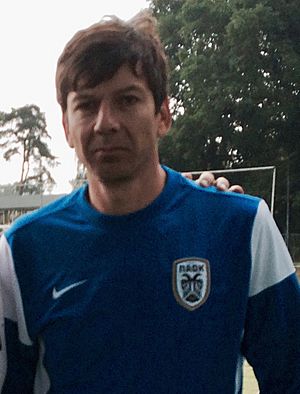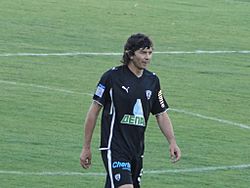Pablo García (footballer, born 1977) facts for kids

García as PAOK coach in 2014
|
|||
| Personal information | |||
|---|---|---|---|
| Full name | Pablo Gabriel García Pérez | ||
| Date of birth | 11 May 1977 | ||
| Place of birth | Pando, Uruguay | ||
| Height | 1.86 m (6 ft 1 in) | ||
| Position(s) | Defensive midfielder | ||
| Team information | |||
|
Current team
|
APOEL (manager) | ||
| Youth career | |||
| 1990–1996 | Montevideo Wanderers | ||
| Senior career* | |||
| Years | Team | Apps | (Gls) |
| 1996–1997 | Montevideo Wanderers | 35 | (1) |
| 1997–2000 | Atlético Madrid B | 38 | (3) |
| 1997 | → Valladolid (loan) | 0 | (0) |
| 1998 | → Peñarol (loan) | 9 | (0) |
| 2000–2002 | Milan | 5 | (0) |
| 2002 | → Venezia (loan) | 14 | (0) |
| 2002–2005 | Osasuna | 78 | (6) |
| 2005–2008 | Real Madrid | 22 | (0) |
| 2006–2007 | → Celta (loan) | 14 | (0) |
| 2007–2008 | → Murcia (loan) | 21 | (0) |
| 2008–2013 | PAOK | 109 | (5) |
| 2014 | Skoda Xanthi | 3 | (0) |
| Total | 348 | (15) | |
| International career | |||
| 1997–2007 | Uruguay | 66 | (2) |
| Managerial career | |||
| 2015–2016 | PAOK U19 (assistant) | ||
| 2016–2020 | PAOK U19 | ||
| 2020–2021 | PAOK | ||
| 2021–2023 | PAOK B | ||
| 2023–2024 | Panserraikos | ||
| 2024–2025 | Atromitos | ||
| 2025– | APOEL | ||
| *Club domestic league appearances and goals | |||
Pablo Gabriel García Pérez, born on May 11, 1977, is a football manager and former player from Uruguay. He used to play as a defensive midfielder, which is a player who helps protect the defense. Currently, he is the manager for Cypriot First Division club APOEL.
People often called him Canario (which means canary). This nickname came from his birthplace, Pando, Uruguay. Pablo García was known for his strong and physical style of play.
He spent a lot of his playing career in La Liga, which is Spain's top football league. He played 135 games over six years for four different teams there. He also played for several seasons in Greece with PAOK.
Pablo García also played for the Uruguay national team for over ten years. He represented his country in the 2002 World Cup and two Copa América tournaments.
Contents
Pablo García's Football Journey
Starting Out in Uruguay and Italy
Pablo García began his football journey in Montevideo Wanderers in his home country, Uruguay. After a short time at Peñarol, he moved to Spain to join Atlético Madrid. However, he only played for their reserve team, Atlético Madrid B.
Two years later, he moved to Italy to play for the famous club AC Milan. He played only five games for Milan during the 2000–01 season. In January 2002, he was loaned to another top Italian club, Venezia. Even though Venezia was relegated (moved down to a lower league), Pablo García played well there.
Playing in Spain's La Liga
In the 2002–03 season, Pablo García moved back to Spain to play for Osasuna. He played very intensely for three seasons with this team. In his first game for Osasuna, on September 1, 2002, he scored a goal and received a yellow card. This game was a 2–2 draw against Villarreal.
In the 2005 Copa del Rey final, Pablo García was a key player for Osasuna. However, he received a red card for a strong challenge. Osasuna eventually lost the game 2–1 in extra time. Despite this, his performance caught the attention of Real Madrid. They signed him to a three-year contract.
Pablo García made his official debut for Real Madrid on September 10, 2005. He played 11 minutes in a 2–3 loss at home to Celta. He competed for the starting defensive midfielder spot.
He helped Real Madrid finish second in the 2005–06 season. However, the new manager, Fabio Capello, decided he was not needed. So, on August 29, 2006, he was loaned to Celta for one year. He had a difficult season there, getting injured often, and Celta was relegated. In July 2007, he returned to Real Madrid and was immediately loaned out again. This time, he joined Real Murcia, a newly promoted team.
Time with PAOK in Greece
After another relegation with Murcia, Pablo García was released by Real Madrid on July 10, 2008. Later that month, he joined PAOK in Greece. He quickly became a favorite among the fans because of his strong play. He received three red cards in his first six games.
His second season with PAOK was much better. PAOK only let in 16 goals in 30 matches, finishing second in the league. Pablo García formed a strong midfield partnership with Spanish player Vitolo. On February 21, 2010, he scored in a 2–1 home win against Panathinaikos. He also extended his contract until 2012.
On May 23, 2012, it was announced that Pablo García, then 35, renewed his contract for another year. However, on March 20, 2013, he left the club by agreement after disagreements with coach Giorgos Donis.
Pablo García returned to PAOK on June 4, 2013, signing a one-year deal. In the winter transfer window, he moved to another Greek team, Skoda Xanthi. He retired from playing football a couple of months later, at the age of 37.
Playing for Uruguay
Pablo García became a full Uruguayan international player on December 13, 1997. This was during a King Fahd Cup match against the United Arab Emirates. He quickly became a regular player for the national team, earning a total of 66 appearances.
He played every minute of Uruguay's games in the 2002 FIFA World Cup. However, he could not help his country qualify for the 2006 World Cup. They lost a penalty shootout to Australia on November 16, 2005.
In the 2007 Copa América quarter-finals, Pablo García scored a powerful goal against Venezuela. But he also missed a crucial penalty kick against Brazil in the next round.
Becoming a Coach
On May 24, 2015, Pablo García returned to PAOK in a new role. The next month, the club's sporting director announced that he would start his coaching career. He became an assistant coach for the under-17 team.
Pablo García then coached the under-19 team and was undefeated for 78 matches. He won three national championships with them. On October 30, 2020, he was appointed coach of the main PAOK team. He led them from sixth place to a second-place finish in the league.
On May 22, 2021, he won the domestic cup with a 2–1 victory against Olympiacos in the final. He was fired shortly after, but was offered a position with the reserve team, PAOK B.
In summer 2023, Pablo García became the coach of Panserraikos, another team in the Greek top league. In the cup quarter-finals, his team was eliminated by PAOK.
On May 11, 2024, Pablo García announced he was leaving Panserraikos. Later that month, he became the manager of Atromitos in the same league. He signed a one-year contract with them.
Coaching Records
Here is a summary of Pablo García's coaching record:
| Team | From | To | Record | |||||||
|---|---|---|---|---|---|---|---|---|---|---|
| G | W | D | L | Win % | ||||||
| PAOK U19 | 10 September 2016 | 29 October 2020 | 85 | 71 | 11 | 3 | 83.53 | |||
| PAOK | 30 October 2020 | 26 May 2021 | 42 | 23 | 9 | 10 | 54.76 | |||
| PAOK B | 15 July 2021 | 19 June 2023 | 58 | 24 | 18 | 16 | 41.38 | |||
| Panserraikos | 4 July 2023 | 11 May 2024 | 38 | 11 | 12 | 15 | 28.95 | |||
| Atromitos | 31 May 2024 | 13 June 2025 | 36 | 13 | 8 | 15 | 36.11 | |||
| Career total | 259 | 142 | 58 | 59 | 54.83 | |||||
Awards and Achievements
As a Player
- Osasuna
- Copa del Rey runner-up: 2004–05
- International
- FIFA U-20 World Cup runner-up: 1997
- Copa América runner-up: 1999
- Individual
- PAOK MVP of the Season: 2011–12
As a Manager
- PAOK
- Greek Cup: 2020–21
See also
 In Spanish: Pablo Gabriel García Pérez para niños
In Spanish: Pablo Gabriel García Pérez para niños
 | Emma Amos |
 | Edward Mitchell Bannister |
 | Larry D. Alexander |
 | Ernie Barnes |


